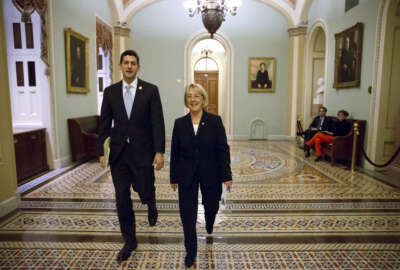
Why the push toward evidence-based policy doesn’t have to be scary for feds
The Office of Management and Budget says some agencies have acknowledged the administration's initiative to build evidence-based policy agendas with varying degrees...
For some employees in an agency program office, the term “evidence-based policy,” is a loaded phrase that could imply budget or staffing cuts if the research points to inefficiencies or under-performing work.
This kind of fear, in part, explains why agencies are at vastly different stages today in implementing their own learning agendas and building evidence-based policy.
It’s also why in its June reorganization plan, the Office of Management and Budget proposed agencies strengthen their focus on building evidence and learning agendas, said Diana Epstein, evidence team lead at OMB. OMB had previously advocated for agencies to consider these agendas for several consecutive years in the president’s annual budget request.
“We have a few agencies that are leaders, that have been doing this well for a number of years,” Epstein said Thursday at the Urban Institute’s forum on building evidence and learning agendas in Washington. “We can hold them up as great examples. We also have a number of agencies that are starting down this road, they think it’s a good idea, they’re curious and would like to go forward, but they’re not sure how. Then quite frankly, we have a set of agencies that have no idea what we’re talking about and don’t really see why this would be helpful for them.”
The Health and Human Services Department has been a leader in this space for several years. Learning agendas are a part of the department’s annual research planning process, and some individual HHS programs also have their agendas.
HHS’ effort has been successful, in part, because the department began talking to its employees about the effort in a different way.
“We started actually talking to our program partners about ‘learning’ rather than ‘research and evaluation,'” said Emily Schmitt, deputy director for the Office of Planning, Research and Evaluation at the Health and Human Services Department’s Administration for Children and Families. “It’s a friendlier open to say, ‘How can we help you learn about your program?’ rather than, ‘How can we do research on your program?'”
“[It’s] not going in and saying should this program exist or not exist?” Schmitt said. “But are there things we can learn about how to help you improve your program that then is within your power to act on?”
The Small Business Administration has gradually become another leader in evidence-based policy. SBA became interested in the idea of using learning agendas to inform policy and programmatic decisions several years ago, but the agency started a “centralized evaluation unit” in earnest back in 2016.
SBA collected potential research questions from its program offices as part of a “learning agenda roadshow.” Agency leaders visited program offices at headquarters and in the field to solicit their ideas and priorities.
“[We] asked the programs what are the questions that if answered, would make your offices run more smoothly, more effectively, more efficiently?” said Terell Lasane, lead program evaluator for SBA’s Office of the Chief Financial Officer.
The “roadshow” concept helped SBA engage and get its employees excited in the learning agenda concept, Lasane added.
“We are generally interested in what you have to say,” he said. “We know that because you’re working on the ground and the various levels you have at the program that you have a voice that’s valued and needs to be heard. We would like to use this information to improve life for everybody. That’s easier said than done sometimes. … We see evaluation and evidence as something that’s being done with you and for you, and not to you.”
The U.S. Agency for International Development launched a concerted learning agenda effort this summer around the administrator’s push to build the agency up to the point where it can empower the countries it works with to solve their own development challenges.
“At the same time we’re taking this on, we’re getting people in the agency used to us performing this function. We’re pushing in some areas and being directive and proactive, and in other areas we’re being opportunistic and just trying to mine existing data or existing learning agendas or activities that are ongoing,” said Melissa Patsalides, acting deputy assistant administer for USAID’s Bureau for Policy, Planning and Learning.
SBA collected the ideas and whittled the list down to inform its “enterprise learning agenda,” which the agency published back in February. The agenda identifies SBA’s priorities and maps them to the agency’s strategic plan. Lasane said the agency views the agenda as a living document, one that could evolve over time as administration priorities change.
“We try to keep the accent on program improvement, and that seems to get people a little more engaged and less anxious about evaluation,” he said.
Copyright © 2025 Federal News Network. All rights reserved. This website is not intended for users located within the European Economic Area.
Nicole Ogrysko is a reporter for Federal News Network focusing on the federal workforce and federal pay and benefits.
Follow @nogryskoWFED
Related Stories





